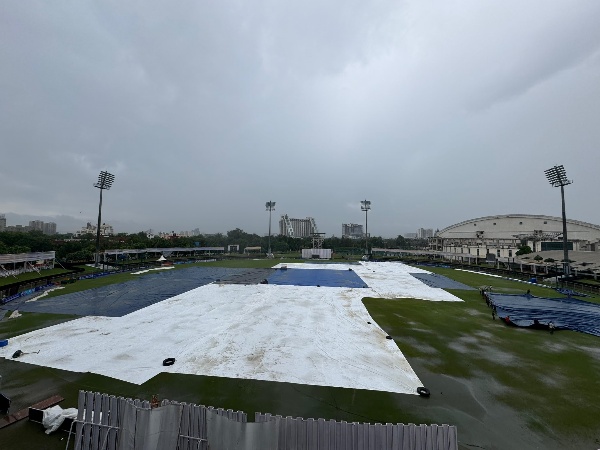Major issues that disturbed the Afghanistan vs New Zealand Test
The one-off Test match between Afghanistan and New Zealand at the Greater Noida Sports Complex has been severely impacted by inclement weather. Heavy rainfall has led to several slushy pockets forming on the ground, and the drainage system has been overwhelmed, causing significant delays. For the third consecutive day, play has been impossible, with not even the coin toss being conducted. The persistent wet conditions have raised serious concerns that the entire match could be canceled. On Tuesday, the Afghanistan Cricket Board (ACB) issued a statement acknowledging the dire circumstances. Despite their best efforts to address the situation, the adverse weather conditions have proven to be a major hurdle. The ACB is working tirelessly to find a solution and initiate the game, but the extent of the rainfall has made it increasingly challenging to make the ground playable.
With the weather showing no signs of improvement and the ground conditions deteriorating further, the likelihood of the Test match going ahead is diminishing. The situation remains fluid, and both teams, as well as fans, are left in suspense about the potential for play. The ongoing efforts by the ACB highlight their commitment to resolving the issue, but the persistent wet weather continues to cast a shadow over the possibility of any cricket being played.
What is the major reason for the Afghanistan vs Bangladesh Test being disturbed?
"If it rains like this, no venue is going to be able to host a game," Menhajuddin Raz, ACB's international cricket manager said.
Despite a dry day on Tuesday, the one-off Test match between Afghanistan and New Zealand at the Greater Noida Sports Complex has yet to commence, sparking questions about the delay. The key issue lies in the nature of the outfield, which is not sand-based. Sand-based outfields are typically better at absorbing moisture and drying out quickly, but this ground's outfield has proven problematic. The drainage system, already overwhelmed by the heavy rainfall that has affected Delhi and Greater Noida, has struggled to cope with the deluge.
Efforts to protect the ground have been limited to the main square, including the playing surface, practice pitches, and the 30-yard circle. Unfortunately, many areas of the outfield, as well as spots within the inner circle—such as midwicket, mid-off, and cover—remain slippery. An official at the venue reported that the top layer of the outfield has become unstable, making it unsafe for play. The poor condition of the outfield contributed to a significant incident: Afghanistan's opening batter, Ibrahim Zadran, slipped during practice and injured his ankle, ruling him out of the Test. The Afghanistan Cricket Board (ACB) has issued a statement acknowledging the injury, attributing it to the deteriorated ground conditions.
As hosts, the ACB is responsible for ensuring the venue is match-ready. The BCCI has provided additional machinery to improve conditions, and Ankit Dutta, curator at Feroz Shah Kotla in Delhi, was sent to assist with the situation. Despite these efforts, Dutta has reported that no immediate solution is apparent, leaving the prospects for the Test uncertain. In recent days, both Afghanistan and New Zealand have faced significant challenges in holding effective net sessions due to the unplayable conditions at the Greater Noida Sports Complex. On Tuesday, New Zealand managed only light training on the main square, but their fast bowlers were unable to complete their full run-ups. According to an official at the venue, while the super sopper has been a helpful addition, it cannot resolve the issue of the loose top layer of the outfield, which can only be addressed by extended periods of sunshine.
This Test match, not part of the ICC's World Test Championship, has not drawn direct involvement from the ICC beyond appointing match officials. However, the situation has prompted questions about whether adequate measures were taken to ensure the venue could handle adverse weather conditions. The Afghanistan Cricket Board (ACB) has insisted that proper due diligence was conducted to prepare the ground, although the persistent issues suggest that there may have been oversights in assessing the venue's resilience to heavy rainfall.
The third day has been called off. Teams and officials will return tomorrow to reinspect #AFGvNZ
— BLACKCAPS (@BLACKCAPS) September 11, 2024
"Look, the venue is an international standard venue. It has hosted around 12 [11] games internationally. It's not like it's a new venue. It's just the rain which has affected everything so much. And that's the only reason we're not having a game on day two. As per the international standard, like at least three-four months, even six months before, you make a recce of the venue. And then, you make sure everything is normal. It's not only us [the home team] who does this recce. It's the visiting team as well - their team and their player association team do the recce, too. Everything was so good," Raz added.
Raz had hoped that, if the rain held off, the Test match could commence on Wednesday. However, just minutes after his optimistic statement, heavy rainfall resumed, leading to yet another day without play. The persistent downpour forced officials to call off the match for the third consecutive day. Despite their best efforts to prepare the ground and manage the conditions, the relentless rain has made it impossible to start the game. The situation remains challenging, with the weather continuing to thwart any attempts to get the match underway. The delay has raised concerns about the feasibility of completing the Test, with both teams and fans growing increasingly frustrated. The ongoing weather issues underscore the difficulties faced in ensuring a playable surface and highlight the need for better preparation and contingency planning for such unforeseen circumstances.
